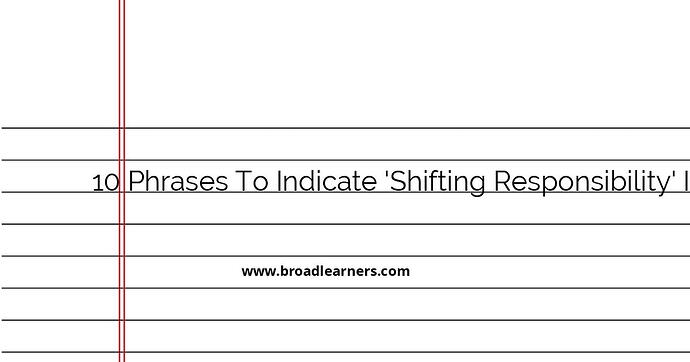When it comes to shifting responsibility in English, there are several phrases that people use to avoid taking the blame or accountability for a situation. These phrases can help you politely deflect responsibility or shift the focus away from yourself. Here are 10 phrases commonly used to indicate 'shifting responsibility' in English:
- Passing the Buck: This phrase implies blaming someone else or transferring responsibility to another person or party. For example, 'I'm just passing the buck on this issue to the marketing team.'
- Throwing someone under the bus: This expression means to betray someone or sacrifice them to save oneself. For instance, 'I hate to throw him under the bus, but he was responsible for the mistake.'
- Finger-pointing: This phrase refers to blaming others or pointing out their mistakes instead of taking responsibility. You could say, 'Stop all the finger-pointing and let's focus on finding a solution.'
- Shifting the blame: This phrase indicates transferring the responsibility or fault to someone else. An example would be, 'He's always shifting the blame onto his colleagues when things go wrong.'
- Passing the buck: This term suggests avoiding responsibility or transferring it to another person. For instance, 'I can't make a decision, so I'm just passing the buck to my supervisor.'
- Deflecting responsibility: This phrase means shifting blame or accountability away from oneself. You could say, 'She's an expert at deflecting responsibility and never admits to her mistakes.'
- Letting someone else take the fall: This expression implies allowing someone else to bear the consequences or blame. For example, 'I won't let him take the fall for my error; I'll own up to it.'
- Avoiding the issue: This phrase means steering clear of addressing or dealing with a problem directly. An example would be, 'He's great at avoiding the issue and changing the subject when things get tough.'
- Placing the responsibility elsewhere: This phrase indicates putting the onus or obligation on another person or entity. For instance, 'She's always placing the responsibility elsewhere instead of taking charge.'
- Shifting accountability: This term means transferring the responsibility for something onto someone else. You could say, 'The manager is skilled at shifting accountability and making others culpable for her decisions.'
Using these phrases can help you navigate tricky situations where you need to shift responsibility without directly admitting fault. However, it's essential to remember that taking accountability for your actions is crucial for building trust and maintaining integrity in all relationships.
Did I miss anything? Respond below
